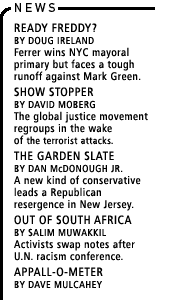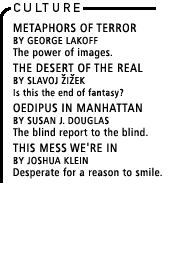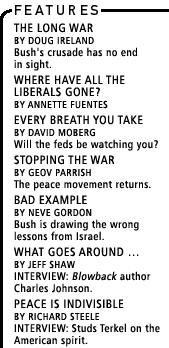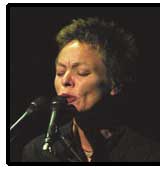|
|

|

|

|
|
|
| |
|
|
|
What happens when an event of such colossal calamity and perfidy supercedes
If the destruction of the World Trade Center is indeed some kind of turning point for America, then we can expect the meaning we apply to music to change as well. Following the disaster, various cultural events around Chicago were canceled or postponed, either out of respect or simply logistics. But other artists went forward with their plans, perhaps foolishly or bravely but certainly surrounded by an air of curiosity. How would the national mood flavor what would typically be a time for celebration? How can a single singer affect the mood of a crowd, desperate for a reason to smile? And what would the context of malaise and depression do for the songs themselves? The night of the terrorist attack, Laurie Anderson performed to a still dazed audience. She opened by dedicating the set to "everybody that died," her sole mention of what had happened. But Anderson's music documents the disorder and confusion of the modern world, and few might have predicted the power her music attained. Though the set drew from two decades of her work, it could have just as easily been composed that morning. Full of oblique references to death and overt references to angels, the ghostly music fit the mood all too well, especially when Anderson intoned the chilling "O Superman": "Here come the planes. They're American planes. Made in America. Smoking or non-smoking? And the voice said: Neither snow nor rain nor gloom of night shall stay these couriers from the swift completion of their appointed rounds. 'Cause when love is gone, there's always justice. And when justice is gone, there's always force." Polly Jean Harvey, who had intended to fly back to England to accept a prestigious music award, opened her set that Thursday night with an impromptu speech. She noted that she and her band had debated whether to play, but she ultimately decided that "we need you, and you need us." She then proceeded to play "This Mess We're In," a song ostensibly about a relationship gone wrong that was transformed into a haunting eulogy. "Can you hear them? / The helicopters? / I'm in New York. / No need for words now. / We sit in silence. / I think it's Wednesday, the evening. / This mess we're in." "Big Exit" packed an equally powerful double meaning: "I walk on concrete / I walk on sand / But I can't find / A safe place to stand / I'm scared baby / I wanna run / The world's crazy / Gimme a gun." For the audience that night those lyrics will never be the same again. On Monday Lucinda Williams played, but the singer seemed notably subdued. By then the country had begun to move on, or at least appeared to be doing so, but that sense of dread lingered. Television replayed the images into a numbing blur, and commentators, politicians and citizens alike continued to express a frightening bloodlust that seemed to stem as much from shock as from honest desire for vengeance. Williams, dazed, appeared to be grappling with these dual instincts, one of pacifist restraint and one of angry retribution. "We've been playing a song that says everything I've been feeling," she said at the end of her set, before launching into Bob Dylan's 1963 "Masters of War." That song remains one of Dylan's bitterest and bloodiest but also one of his most complex. Most of "Masters of War" is a tirade against warmongers and supporters of violence. It points the finger at those who would send others into battle for them and then profit from the carnage. But as the song reaches its conclusion, it shatters the thin ceiling of restraint. Just as Dylan wrote it, Williams couldn't hold the rage in any longer: "And I hope that you die / And your death'll come soon / I will follow your casket / In the pale afternoon / And I'll watch while you're lowered / Down to your deathbed / And I'll stand o'er your grave / 'Til I'm sure that you're dead." Like the songs sung in the wake of the tragedy, events seem to
be spinning out of our control. How can we sit still and silent
when to wait would be to invite more pain and suffering? How can
we fight back when such an exercise seems unlikely to stop those
few individuals who would do us harm? Our culture and morality are
shifting under us even as we speak and sing, and the musicians and
artists that once helped us make sense of the world seem as lost
and frustrated as we are.
|





